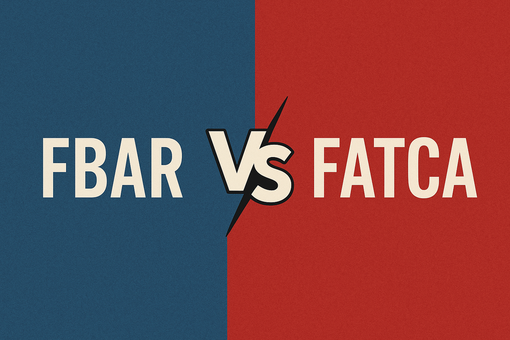Tax Guide for French Expats in the U.S.

Let’s say you just made your way to the United States and are thinking about relocating, chances are you have a lot of questions. Those queries may also involve the U.S. tax system, what the types of visas are and what a substantial presence test is. You may also need answers about retirement accounts abroad and foreign bank account report filing.
Fortunately, you have come to the right place. Read on below to get all the answers you need.
Immigrant or Non-Immigrant
U.S. tax obligations of the French in the U.S. primarily depend on the Visa type under which they were admitted to the U.S.
There are two main categories of visas for the US: immigrant and nonimmigrant (in other words: permanent and temporary). Nonimmigrant visas are granted for tourists, students, researchers, and short-term work placements. Government employees and diplomats also enter the U.S. under non-immigrant visa types.
Non-immigrants with income from the U.S. file non-resident tax returns and pay tax only on income from U.S. sources.
Immigrant visas give permanent residence in the USA, so it’s a much-coveted thing amongst French expats in America. Immigrant visas may be employment-based or family-based. Generally, U.S. tax obligations begin from the first day where you cross the U.S. border but the devil is in the details.
Resident or Non-Resident
The second factor that determines the scope of U.S. tax obligations is the length of stay in the U.S.
The Substantial Presence Test is a criterion that the IRS uses to determine whether the French qualify as either a resident or nonresident for tax purposes.
Even a holder of a non-immigrant visa will become a U.S. resident for tax purposes if they meet the Substantial Presence Test. Consequently, they will have the same U.S. tax filing obligations that immigrant visa holders.
An exception is given to students, researchers, employees of a French government and diplomats. They are treated as nonimmigrants even if they met the Substantial Presence Test. So are members of their immediate family (spouse and children).
U.S. Green Card
Citizens of France who were granted a U.S. Green Card or met the Substantial Presence Test are considered U.S. Resident Aliens. For resident aliens, the rules for filing income, estate, and gift tax returns and paying estimated tax are generally the same as for U.S. citizens.
The main difference between Green Card holders and those who become resident aliens by meeting the Substantial Presence - a Green Card holder has a full range of U.S. filing obligations even if they do not spend a single day in the U.S. during the tax year.
Basics of US Tax
Signed and ratified in 1994, with protocols added in both 2004 and 2009, the US-France income tax treaty defines which circumstances people will pay tax to which country, including those who are residents of both US and France. It also defines which circumstances international structures like investment vehicles, corporations, and trusts will be taxed by which country.
The treaty also covers relief from double taxation for Americans living in France and French citizens living in the US. Rather than simply exempting American expats residing in France from filing US taxes, the treaty lets them claim US tax credits with the same value as French income taxes that they’ve paid, when they file their US federal tax return.
Taxes can be very complicated in any country but it’s pertinent for a French expat to first know what the basics of the US tax system are:
1. Federal Income Tax
The U.S. government imposes a federal income tax based on income levels. There are seven tax brackets ranging from 10% to 37%.
2. State Income Tax
It is important to determine how state taxation will factor into where you decide to live. Most states impose a personal income tax, with the exception of Alaska, Florida, Nevada, South Dakota, Texas, Washington and Wyoming. State income taxes vary but are generally in the range of 0-12.3%.
3. Local Income Tax
Local income tax refers to an additional city or county tax assessed in certain municipalities. Generally speaking, local taxes are not higher than 1-2%, with the exception of New York City.
4. Social Security Tax and Medicare
This tax is based on “earned” income such as salary paid to an employee or a sole proprietor’s earnings. U.S. Social Security tax of 6.2% is paid on wages up to a maximum of $142,800
(for 2021). Medicare tax is 1.45% on wages (there is no maximum). This is only half of the total tax, the second half is paid by the employer. If you are a sole proprietor, you pay both the employee and employer portion titled SECA tax.
Diplomats, employees of the French government, their families, and their home employees (nannies and housekeepers) are exempt from U.S. Social Security and Medicare taxes on salaries paid to them.
Taxpayer Identification Numbers
All individuals filing tax returns must have a U.S. Social Security number (SSN) or an individual tax identification number (ITIN). ITIN is not just for tax filing purposes; it is your unique U.S. government identifier needed for selling residences, obtaining driver’s licenses, opening certain bank accounts and more. An ITIN must be renewed every 5 years.
Sale of Assets and Capital Gains Tax
Once you become a U.S. Resident Alien, proceeds from the sale of home in France or anywhere else in the world will be included in U.S. taxable income on your U.S. tax return, as part of your worldwide income. There is a special provision to exempt the first $250K of capital gains from U.S. tax if the home meets the IRS-defined criteria of a primary residence.
Give careful consideration to the disposal of your French assets and the potential tax ramifications of doing so. The cost basis for the assets will be the historical purchase price, not the value of the asset when you became a U.S. tax resident. If you are not careful, you may face a situation where you pay U.S. tax on gains earned long before you came to the U.S.
Retirement Accounts
Tax Rules for non-US retirement accounts are different from the U.S. retirement accounts. French who became U.S. Resident Alien cannot “roll over” funds from French retirement accounts to U.S. retirement accounts. Any distribution from such retirement plans will be fully taxable in the U.S., even if it is non-taxable in France.
You will pay tax regardless whether you transfer those funds to the U.S. or leave in France. Approach such distributions carefully and consult a U.S. tax advisor prior to taking those steps.
Reporting Requirements: Banks, Financial Accounts and Assets
FinCEN 114 (FBAR) is a “Report of Foreign Bank and Financial Accounts”. The FBAR form is filed electronically with the Financial Crimes Enforcement Network, a division of the U.S. Department of Treasury (not part of your tax return which is submitted to the IRS). A U.S. citizen or Resident Alien who owns or has signature authority over non-US financial accounts with an aggregate balance of $10,000 or higher on any given day during the calendar year must file this form.
Foreign accounts include bank, investment accounts and insurance policies. The balance on non-US retirement accounts (in France or any other country) is also counted towards the $10,000 threshold and must be reported. Joint bank accounts with a spouse who is not a U.S. resident and stays in France count and must be reported, as well.
Another financial reporting form is form 8938 (FATCA). It is similar to FBAR in that regard that the form is only informational (does not impact potential tax due or refund), but the filing threshold is higher. This form, unlike FBAR, is submitted as part of your US tax return to the IRS. French who became Resident Aliens in any calendar year must provide information on their non-US financial assets with an aggregate value of more than $50,000 and attach that form the U.S. income tax return.



